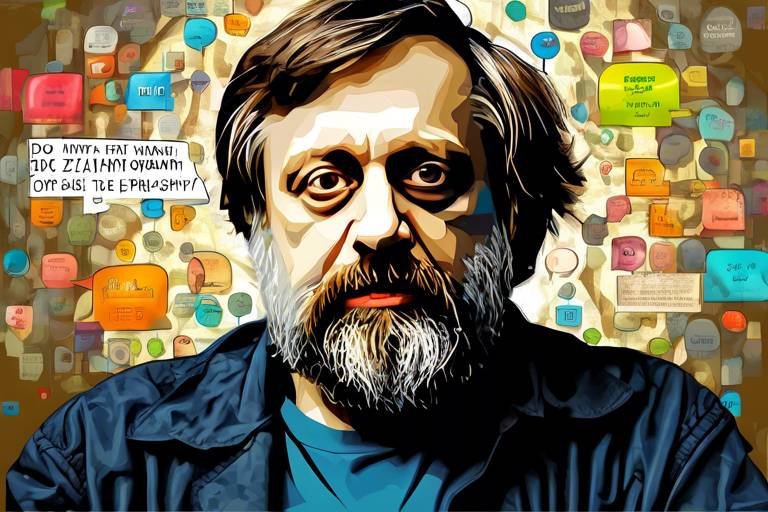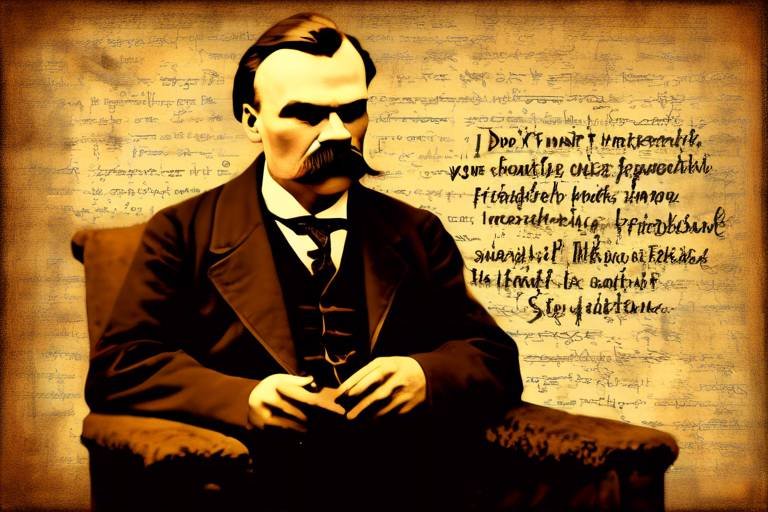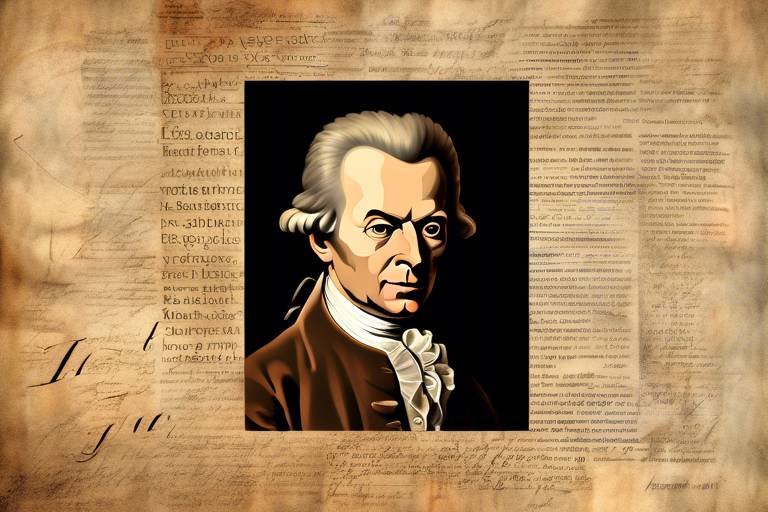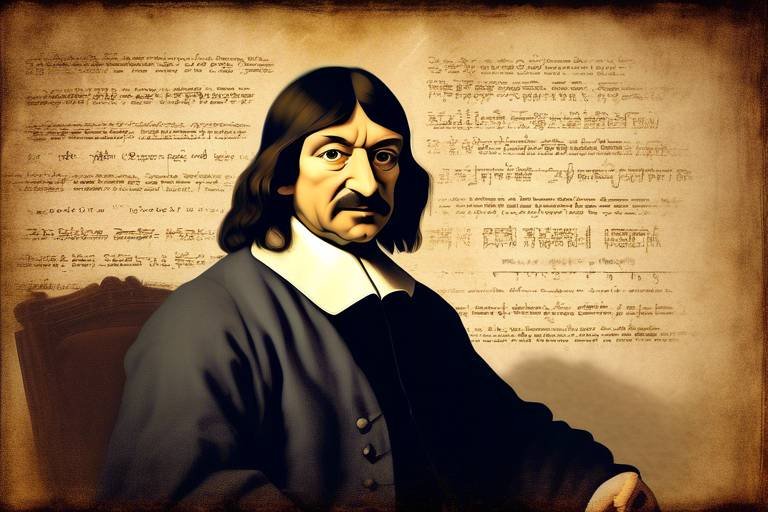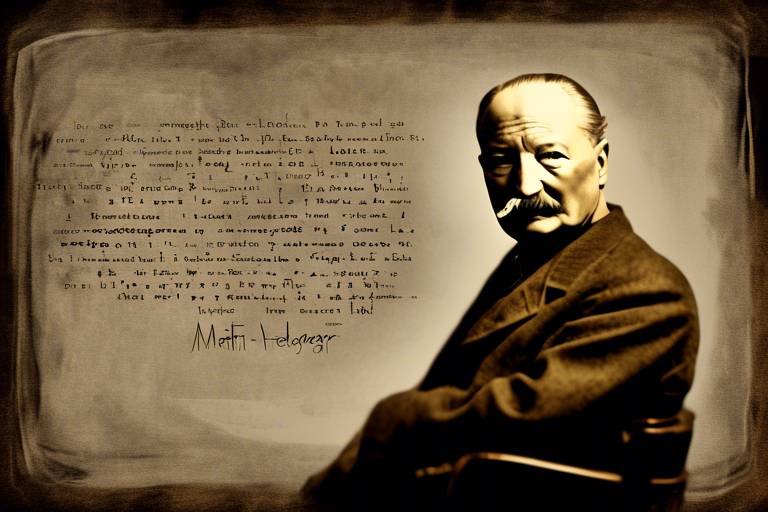Analyzing Spinoza's Rationalistic Philosophy
When diving into the world of philosophy, one might feel like they’re embarking on a thrilling adventure, filled with twists and turns that challenge the very fabric of our understanding. Among the many philosophers who have shaped our thoughts, Baruch Spinoza stands out as a beacon of rationalistic thought. His ideas not only provoke thought but also spark debate that resonates through the ages. In this article, we will explore the core tenets of Spinoza's rationalistic philosophy, examining his views on God, nature, ethics, and how his thoughts have influenced modern philosophy.
Spinoza's conception of God is nothing short of revolutionary. Unlike the traditional views that often depict God as a distant, anthropomorphic being, Spinoza presents a strikingly different image. For him, God is synonymous with nature and the universe itself—a perspective that leads to a pantheistic understanding. This notion reshapes the divine, suggesting that everything around us, from the smallest atom to the vast cosmos, is an expression of the divine essence. Imagine looking at a beautiful sunset and realizing that you’re witnessing God in action. This interconnectedness invites us to see ourselves not as separate from the divine but as integral parts of a greater whole.
At the heart of Spinoza's philosophy lies his ethical framework, which is both profound and practical. He posits that true happiness and virtue can be achieved through a rational understanding of ourselves and our emotions. It’s almost like having a roadmap to navigate the often tumultuous waters of life. Spinoza believes that by understanding our emotions and managing them rationally, we can lead a life that is not only fulfilling but also aligned with our true nature. This approach to ethics encourages us to embrace our humanity while striving for something greater—an alignment with the universe itself.
In Spinoza's view, reason is the compass that guides us toward ethical living. He asserts that our actions should be informed by rational thought, steering us toward behaviors that benefit not just ourselves but the greater good of humanity. When we act based on reason, we are more likely to engage in actions that promote harmony and understanding among all beings. It’s like tuning into a universal frequency—when we align our actions with reason, we resonate with the world around us.
Understanding emotions is a cornerstone of Spinoza's ethical teachings. He argues that while emotions are natural, they can often lead us astray if left unchecked. By advocating for the rational control of passions, Spinoza provides a framework for achieving a state of tranquility and joy. Picture your emotions as wild horses; without guidance, they can run rampant. However, when we harness them with reason, they can carry us toward a fulfilling life.
For Spinoza, happiness is not a fleeting moment of joy but a deeper, more profound state of being that stems from the cultivation of knowledge and the practice of virtue. He believes that as we grow in understanding, we uncover layers of our existence that lead us to a richer experience of life. It's akin to peeling an onion—each layer reveals more about ourselves and the universe, ultimately leading us to a place of genuine contentment. This pursuit of happiness is not just a personal journey; it’s an exploration that connects us with the cosmos.
One of the more controversial aspects of Spinoza's philosophy is his stance on determinism. He argues that the universe operates under a set of natural laws, challenging the traditional notions of free will. However, this doesn’t mean we are mere puppets on strings. Instead, Spinoza suggests that true freedom arises from understanding the necessity of nature and our place within it. It’s like realizing that while we may not control the wind, we can adjust our sails to navigate the seas of life effectively.
Spinoza's ideas have cast a long shadow over various fields, including philosophy, psychology, and political theory. His thoughts have ignited discussions about rationalism and human nature that continue to this day. It's fascinating to see how a philosopher from the 17th century can still inspire contemporary debates and ideas.
The Enlightenment era was profoundly influenced by Spinoza's work. Thinkers like Leibniz, Hume, and Kant grappled with his ideas, particularly in relation to reason and ethics. They took the seeds that Spinoza planted and cultivated them into a rich garden of thought that shaped modern philosophy.
Even today, Spinoza's rationalism resonates in discussions surrounding ethics, metaphysics, and the philosophy of mind. His ideas challenge us to reconsider our understanding of freedom, morality, and the interconnectedness of all things. It’s as if he handed us a mirror, urging us to reflect on our existence and our relationship with the universe.
- What is Spinoza's view on God?
Spinoza sees God as synonymous with nature, advocating for a pantheistic understanding where everything is part of the divine. - How does Spinoza define happiness?
Spinoza believes happiness comes from cultivating knowledge and practicing virtue, leading to a deeper understanding of oneself and the universe. - What is the significance of reason in Spinoza's ethics?
Reason is crucial for ethical living, guiding individuals toward actions that align with their true nature and the greater good. - Does Spinoza believe in free will?
Spinoza posits a deterministic universe, suggesting that true freedom comes from understanding the necessity of nature.

The Nature of God in Spinoza's Philosophy
When we dive into Spinoza's philosophy, we quickly realize that his understanding of God is a radical departure from traditional views. For Spinoza, God is not a distant, anthropomorphic figure residing in the heavens, but rather, God is synonymous with nature itself. This concept leads us to a pantheistic understanding, where God and the universe are intertwined, shaping a worldview that invites us to see the divine in everything around us.
Imagine walking through a lush forest, feeling the gentle breeze and listening to the rustling leaves. According to Spinoza, that experience is not just a natural phenomenon but a glimpse into the divine essence that permeates all existence. In his view, everything that exists is a manifestation of God, and thus, we are all part of a greater whole. This interconnectedness challenges us to reconsider our relationship with the world, urging us to recognize that our actions and thoughts resonate within the fabric of the universe.
One of the most striking aspects of Spinoza's philosophy is his rejection of the idea of a personal God who intervenes in human affairs. Instead, he presents a vision of God as an infinite substance with an infinite number of attributes, of which we can only comprehend a few, namely thought and extension. This leads to a more abstract understanding of divinity, where God's essence is found in the laws of nature and the rational order of the universe. In this light, God is not a being but the very essence of existence itself.
To further illuminate Spinoza's perspective, consider the following table that contrasts traditional views of God with Spinoza's interpretation:
| Aspect | Traditional View | Spinoza's View |
|---|---|---|
| Nature of God | Personal, anthropomorphic being | Identical to nature and the universe |
| Divine Intervention | Intervenes in human affairs | No intervention; all is determined by natural laws |
| Understanding of Existence | Existence as separate from God | Existence is a manifestation of God |
This pantheistic view not only reshapes the divine but also our ethical responsibilities. If God is present in all things, then our treatment of nature and each other becomes a reflection of our understanding of the divine. In essence, Spinoza invites us to live in harmony with the world, recognizing that every action reverberates through the universe.
In summary, Spinoza's conception of God as nature challenges us to rethink our spiritual beliefs and ethical obligations. By understanding God as an integral part of the universe, we are encouraged to foster a sense of unity with all existence, promoting a deeper appreciation for the interconnectedness of life. This perspective not only enriches our understanding of the divine but also enhances our commitment to living a virtuous and meaningful life.

Spinoza's Ethical Framework
At the heart of Spinoza's philosophy lies a compelling ethical framework that challenges conventional morality and emphasizes the power of reason. Spinoza believed that true happiness is not just a fleeting emotion but a profound state of being that arises from understanding the world around us. He argued that by cultivating our rational faculties, we can attain a deeper sense of joy and virtue in our lives. This approach to ethics is not merely about following rules; it's about comprehending the very fabric of existence and our place within it.
Spinoza posited that our emotions, often seen as chaotic and uncontrollable, could actually be understood and managed through reason. He viewed emotions as natural phenomena that, when properly understood, could lead us to a more fulfilling existence. In his view, the path to ethical living involves recognizing the interplay between our emotions and our rational thoughts. By mastering our passions, we can achieve a state of tranquility and ultimately experience true happiness.
To illustrate his ethical framework, Spinoza proposed several key concepts:
- Rational Understanding: Emphasizing the importance of knowledge, Spinoza believed that understanding the nature of reality allows individuals to make informed decisions that align with their true essence.
- Emotional Management: He taught that by recognizing and controlling our emotions, we can prevent them from leading us astray, thus achieving a more balanced life.
- Virtue as Knowledge: For Spinoza, virtue is not just about moral behavior; it is the expression of our understanding of the universe and our connection to it.
Spinoza's ethical framework is not just about personal happiness; it also emphasizes the importance of the greater good. He believed that when individuals act in accordance with their true nature, they contribute positively to the well-being of others. This interconnectedness is a vital aspect of his philosophy, suggesting that our actions should reflect a commitment to the collective welfare of humanity.
Moreover, Spinoza's idea of happiness is closely tied to the cultivation of knowledge. He argued that as we expand our understanding of ourselves and the universe, we inevitably enhance our capacity for joy. This pursuit of knowledge is not just an intellectual exercise; it is a fundamental aspect of our ethical journey. By embracing knowledge, we align ourselves with the natural order of the world, leading to a harmonious existence.
In summary, Spinoza's ethical framework is a rich tapestry woven from the threads of reason, emotion, and virtue. It encourages us to engage deeply with our inner selves and the world around us, ultimately guiding us toward a life filled with meaning and happiness. By understanding and mastering our emotions, we can navigate the complexities of existence and contribute positively to the fabric of society.
- What is the core of Spinoza's ethical philosophy?
Spinoza's ethical philosophy centers around the idea that true happiness and virtue arise from rational understanding and emotional management. - How does Spinoza view emotions?
Spinoza sees emotions as natural phenomena that can be understood and controlled through reason, leading to a more fulfilling life. - What role does knowledge play in Spinoza's ethics?
Knowledge is fundamental in Spinoza's ethics; it allows individuals to align their actions with their true nature and contributes to personal and collective happiness.

The Role of Reason in Ethics
In the intricate tapestry of Spinoza's philosophy, reason emerges as the golden thread that weaves together the fabric of ethical living. He firmly believes that reason is not just a tool for understanding the world; it is the very foundation upon which ethical behavior is built. Imagine a compass guiding a ship through stormy seas—this is how Spinoza views reason in the context of human morality. It directs individuals toward actions that resonate with their true nature and align with the greater good of humanity.
Spinoza asserts that emotions, while powerful, can often lead us astray if left unchecked. He encourages us to harness the power of reason to navigate our emotional landscapes. This is not to say that emotions should be suppressed; rather, they should be understood and integrated into our decision-making processes. By applying reason, we can discern which emotions serve us and which ones might lead us into turmoil. For instance, consider the feeling of anger. Without reason, anger can propel us into destructive actions, but when tempered with rational thought, it can become a catalyst for positive change and justice.
Moreover, Spinoza’s ethical framework emphasizes the importance of understanding the interconnectedness of all things. He posits that when we act in accordance with reason, we not only benefit ourselves but also contribute to the well-being of others. This interconnectedness fosters a sense of community and shared responsibility. Therefore, ethical living, in Spinoza's view, is not merely about individual morality; it is about recognizing our role in the larger web of existence.
In practical terms, Spinoza's philosophy invites us to engage in self-reflection and critical thinking. He challenges us to ask essential questions such as: What motivates my actions? and How do my choices affect those around me? By cultivating a habit of reasoning, we can elevate our ethical standards and make decisions that reflect our highest values.
Ultimately, Spinoza’s emphasis on reason in ethics serves as a powerful reminder that we are not slaves to our passions. Instead, we hold the reins of our moral choices. The journey toward ethical living is a continuous process of learning, adapting, and growing—one where reason is our steadfast companion, illuminating the path toward a virtuous life.
- What is the primary role of reason in Spinoza's ethics? Reason helps individuals align their actions with their true nature and the greater good.
- How does Spinoza view emotions in relation to ethics? He believes that emotions should be understood and managed through reason to achieve ethical living.
- Why is interconnectedness important in Spinoza's ethical framework? It emphasizes that our actions impact not only ourselves but also the well-being of others.
- What questions should we ask ourselves to apply Spinoza's philosophy? Consider motivations behind actions and the effects of choices on others.

Emotions and Rational Control
In the realm of Spinoza's philosophy, emotions play a pivotal role in shaping our experiences and actions. He proposes that understanding and managing our emotions is not just beneficial but essential for achieving a harmonious life. Imagine emotions as the currents of a river; they can either carry you gently along or sweep you away in a turbulent flood. Spinoza emphasizes that by exercising rational control over these emotional currents, we can navigate through life with greater ease and purpose.
Spinoza categorizes emotions into two main types: active and passive. Active emotions arise from a clear understanding of our desires and the world around us, while passive emotions are often reactions to external stimuli that can lead us astray. To illustrate this, consider the difference between feeling joy from achieving a personal goal (an active emotion) versus feeling anger when someone cuts you off in traffic (a passive emotion). The latter can cloud your judgment and lead to actions that you might regret later.
To foster emotional intelligence, Spinoza suggests a methodical approach: self-reflection. By examining the roots of our emotions, we can identify the triggers that lead to negative feelings and learn to respond rationally rather than react impulsively. This process is akin to a gardener tending to their plants; by understanding what each plant needs, one can cultivate a thriving garden rather than allowing weeds to take over. In this way, we can prune away unhelpful emotional patterns and nurture those that contribute to our well-being.
Furthermore, Spinoza believes that by cultivating knowledge, we can transform our emotional states. Knowledge acts as a powerful tool that enables us to see the world more clearly and understand our place within it. When we comprehend the causes of our emotions, we gain the ability to reframe our experiences. For example, if we feel jealousy towards a friend’s success, understanding that this emotion stems from our own insecurities can help us shift our perspective from envy to admiration. This shift is crucial; it allows us to channel our energy into positive actions rather than negative feelings.
In conclusion, Spinoza's approach to emotions and rational control is not merely an abstract concept but a practical guide for living a fulfilling life. By mastering our emotions through reason and understanding, we can achieve a state of tranquility and joy. As we navigate the complexities of life, let us remember that the true power lies not in the emotions themselves but in our ability to control and direct them toward a more enlightened existence.
- What is the significance of emotions in Spinoza's philosophy?
Emotions are central to Spinoza's ethical framework; they influence our actions and well-being. Understanding them allows for better control and a more fulfilling life.
- How does Spinoza suggest we manage our emotions?
Spinoza advocates for self-reflection and rational understanding as means to manage and transform our emotional states.
- What are active and passive emotions according to Spinoza?
Active emotions are those that arise from a rational understanding of our desires, while passive emotions are reactions often triggered by external factors.
- Can knowledge help in emotional management?
Yes, Spinoza believes that knowledge enables us to understand the causes of our emotions, allowing us to reframe our experiences and respond more positively.

The Pursuit of Happiness
For Spinoza, happiness is not merely a fleeting emotion or a momentary pleasure; it is a profound state of being that arises from the cultivation of knowledge and the practice of virtue. He believed that true happiness is deeply intertwined with our understanding of ourselves and the universe around us. Imagine happiness as a garden; it requires nurturing, attention, and the right conditions to flourish. In this metaphorical garden, knowledge acts as the sunlight, while virtue serves as the fertile soil that allows our happiness to grow.
Spinoza argued that in order to achieve this state of happiness, individuals must engage in a process of self-discovery and rational inquiry. He emphasized that emotional intelligence plays a crucial role in this journey. By recognizing and understanding our emotions, we can learn to manage them rather than be controlled by them. This rational control over our passions leads to a more tranquil existence, where joy becomes a natural outcome of living in accordance with our true nature.
Furthermore, Spinoza proposed that happiness is not a solitary pursuit; it is inherently social. Our connections with others and our contributions to the greater good are vital components of a fulfilling life. In this sense, happiness can be seen as a collective experience, where the well-being of one is tied to the well-being of all. As we strive for our own happiness, we must also consider how our actions impact those around us.
To encapsulate Spinoza's view on the pursuit of happiness, we can outline several key components:
- Cultivation of Knowledge: Understanding the world and ourselves is foundational to achieving happiness.
- Practice of Virtue: Living a life of integrity and moral uprightness enhances our sense of fulfillment.
- Emotional Management: Learning to control our passions allows us to maintain a state of tranquility.
- Social Responsibility: Recognizing that our happiness is interconnected with the happiness of others fosters a sense of community.
In conclusion, Spinoza's philosophy presents a compelling roadmap for the pursuit of happiness. By emphasizing the importance of knowledge, virtue, and emotional intelligence, he offers a holistic approach to living a fulfilled life. This perspective encourages us to look beyond momentary pleasures and instead focus on nurturing a deeper understanding of ourselves and our place in the universe. In doing so, we not only cultivate our own happiness but also contribute to a more harmonious world.
- What is Spinoza's definition of happiness? Spinoza defines happiness as a state achieved through the cultivation of knowledge and virtue, leading to a deep understanding of oneself and the universe.
- How does emotional intelligence relate to Spinoza's view on happiness? Emotional intelligence is crucial in managing our passions, which allows us to maintain tranquility and joy, essential components of Spinoza's concept of happiness.
- Is happiness a solitary pursuit according to Spinoza? No, Spinoza believes happiness is inherently social and interconnected with the well-being of others.

Determinism and Free Will
When we dive into Spinoza's philosophy, we encounter a fascinating and somewhat challenging concept: the relationship between determinism and free will. Spinoza presents a universe that operates like a grand clockwork mechanism, where everything is interconnected and governed by the laws of nature. This perspective can feel a bit overwhelming, especially when we consider our own sense of choice and agency. Are we mere puppets in a cosmic play, or do we have the strings in our hands?
According to Spinoza, everything that happens is a result of prior causes. In his view, every action, thought, and feeling is determined by a chain of events that can be traced back indefinitely. Imagine a vast web, where each thread represents a cause and effect. When we pull one thread, we can see how it affects others, leading to a cascading series of events. This deterministic view suggests that our choices are not as free as we might like to believe.
However, Spinoza introduces a crucial distinction: while we may not have absolute free will, we can achieve a form of freedom through understanding. This might sound paradoxical, but bear with me. True freedom, in Spinoza's eyes, comes from recognizing the necessity of nature and our place within it. By understanding the reasons behind our emotions and actions, we can align ourselves with the universe's order, leading to a more fulfilling existence.
To illustrate this point, consider the following:
- Awareness of Causes: When we understand the reasons behind our feelings—say, why we feel anger or joy—we can respond more rationally rather than react impulsively.
- Acceptance of Nature: By accepting that events unfold according to natural laws, we can find peace in our circumstances, rather than battling against them.
- Empowerment through Knowledge: Knowledge is power! The more we learn about ourselves and the world, the better equipped we are to navigate life's challenges.
Thus, Spinoza’s deterministic framework does not strip us of our humanity; rather, it encourages a deeper understanding of ourselves and the universe. It’s like being handed a map in a vast forest. While the paths are predetermined, knowing the layout allows us to choose our direction more wisely. In this sense, we find a unique blend of determinism and freedom—a dance between the inevitable and the choices we make within that structure.
In summary, Spinoza challenges us to rethink our assumptions about free will. Instead of viewing ourselves as isolated agents, we are part of a larger tapestry. Our decisions, while influenced by countless factors, can lead us toward a state of true freedom through understanding. This perspective invites us to embrace the complexity of life with open arms, transforming our perceived limitations into opportunities for growth and enlightenment.
- What is Spinoza's view on free will? Spinoza argues that while we may not have absolute free will, we can achieve a form of freedom through understanding the causes of our actions and emotions.
- How does determinism relate to ethics in Spinoza's philosophy? Determinism in Spinoza's philosophy suggests that our ethical choices are influenced by prior causes, but understanding these influences can help us make better decisions aligned with virtue.
- Can we change our fate according to Spinoza? While our circumstances may be determined, Spinoza believes that through knowledge and understanding, we can navigate our lives more effectively and make choices that lead to a fulfilling existence.

Spinoza's Influence on Modern Thought
Spinoza's philosophical contributions have cast a long shadow over the landscape of modern thought, influencing countless disciplines and thinkers. His radical ideas about the nature of reality, ethics, and the divine have sparked a myriad of discussions that resonate to this day. Imagine a pebble thrown into a pond; the ripples of Spinoza's thought continue to expand, touching various fields such as philosophy, psychology, and political theory. His work has not only prompted a reevaluation of established norms but has also paved the way for new ways of thinking about humanity's place in the universe.
One of the remarkable aspects of Spinoza's influence is how he challenged the dualistic thinking prevalent in his time. By proposing that God and nature are one, he opened the door to a more integrated understanding of existence. This pantheistic view has led modern thinkers to reconsider the relationship between humanity and the cosmos, fostering a sense of interconnectedness that is echoed in contemporary environmental ethics and holistic approaches to science. Today, many scholars argue that Spinoza's ideas are crucial for addressing modern crises, such as climate change, as they encourage us to see ourselves as part of a larger whole.
Moreover, Spinoza's emphasis on reason as the guiding principle for ethical living has had a profound impact on the development of Enlightenment thought. His rationalistic approach laid the groundwork for subsequent philosophers who grappled with questions of morality and human behavior. Thinkers like Leibniz, Hume, and Kant were influenced by Spinoza's insistence on the importance of understanding our emotions and desires through the lens of reason. This legacy is evident in the way modern ethical theories often prioritize rationality over tradition or revelation.
Spinoza's ideas also find relevance in contemporary discussions surrounding determinism and free will. His assertion that everything in the universe follows a determined path challenges the conventional notion of free will, prompting modern philosophers and psychologists to explore the implications of this perspective. Are our choices genuinely free, or are they merely the result of prior causes? Such questions remain at the forefront of philosophical inquiry today, with Spinoza's work serving as a critical reference point.
In summary, Spinoza's influence on modern thought is both profound and multifaceted. His ideas have not only shaped philosophical discourse but have also permeated various fields, inviting us to rethink our understanding of ethics, existence, and human nature. As we continue to explore the implications of his rationalistic philosophy, it becomes clear that Spinoza's legacy is not merely historical; it is a living dialogue that challenges us to engage with the complexities of our world.
- What is Spinoza's view of God? Spinoza viewed God as synonymous with nature, advocating a pantheistic understanding where God is not a separate entity but the universe itself.
- How does Spinoza define happiness? For Spinoza, happiness is achieved through the cultivation of knowledge and virtue, leading to a deeper understanding of oneself and the universe.
- What is the significance of reason in Spinoza's ethics? Reason plays a crucial role in guiding ethical actions and understanding emotions, allowing individuals to align their lives with their true nature.
- How did Spinoza influence Enlightenment thinkers? Spinoza's emphasis on rationalism and ethics laid the groundwork for Enlightenment thinkers like Leibniz, Hume, and Kant, who further explored these concepts.

Impact on Enlightenment Thinkers
Baruch Spinoza's philosophical contributions acted as a catalyst for the Enlightenment, a period marked by the emergence of reason as the primary source of authority and legitimacy. His radical ideas about God, nature, and ethics not only challenged the prevailing theological doctrines of his time but also inspired a wave of Enlightenment thinkers who sought to explore the depths of human understanding and morality. Thinkers such as Gottfried Wilhelm Leibniz, David Hume, and Immanuel Kant were profoundly influenced by Spinoza's work, each grappling with his ideas in their unique ways.
For instance, Leibniz admired Spinoza's emphasis on rationalism but diverged in his belief in the existence of individual substances. He viewed Spinoza's monism as a challenge to the plurality of substances that he believed were essential to understanding the universe. This debate over the nature of existence and substance marked a significant philosophical discourse during the Enlightenment.
Similarly, David Hume, known for his empiricism, found Spinoza's deterministic view of the universe intriguing yet problematic. Hume's skepticism about causation and human understanding led him to question the implications of Spinoza's rationalism on free will and moral responsibility. The dialogue between Hume and Spinoza's ideas paved the way for further explorations into the nature of human agency.
Immanuel Kant, on the other hand, was deeply influenced by Spinoza's thoughts on ethics and morality. Kant's categorical imperative can be seen as an evolution of Spinoza's ideas, where the emphasis on rationality and the necessity of moral laws resonate with Spinoza's vision of a rationally ordered universe. Kant's work challenged and expanded upon Spinoza's framework, leading to a rich interplay of ideas that shaped modern moral philosophy.
The impact of Spinoza on these Enlightenment thinkers can be summarized in the following table:
| Thinker | Influence from Spinoza | Key Contributions |
|---|---|---|
| Gottfried Wilhelm Leibniz | Challenge to monism | Plurality of substances |
| David Hume | Skepticism about determinism | Empiricism and causation |
| Immanuel Kant | Ethics and rationality | Categorical imperative |
In conclusion, Spinoza's philosophical legacy is evident in the works of these Enlightenment thinkers. His radical notions challenged the status quo and encouraged a deeper inquiry into the essence of reality, ethics, and human existence. The dialogues sparked by his ideas not only enriched philosophical discourse but also laid the groundwork for modern thought, making Spinoza an enduring figure in the landscape of philosophy.
- What is Spinoza's view of God? Spinoza views God as identical with nature, promoting a pantheistic understanding that diverges from traditional religious beliefs.
- How did Spinoza influence Enlightenment thinkers? His ideas challenged existing notions of theology and ethics, prompting thinkers like Leibniz, Hume, and Kant to engage with and expand upon his concepts.
- What is the significance of reason in Spinoza's ethics? Spinoza emphasizes that reason is essential for ethical living, guiding individuals toward actions that align with their true nature and the greater good.

Relevance in Contemporary Philosophy
Spinoza's rationalism remains a profound influence on contemporary philosophy, igniting debates that resonate through various disciplines today. His ideas challenge us to rethink our understanding of ethics, metaphysics, and even the philosophy of mind. In a world increasingly driven by scientific inquiry and rational thought, Spinoza's emphasis on reason as the cornerstone of human understanding is more relevant than ever. It compels us to ask: How do our beliefs about the universe shape our moral framework?
One of the most intriguing aspects of Spinoza's philosophy is his assertion that everything is interconnected. This perspective aligns with modern scientific views, particularly in fields like ecology and quantum physics, where the notion of interdependence is crucial. For instance, Spinoza's idea that God and Nature are one has found echoes in contemporary environmental ethics, where the health of our planet is seen as intrinsically linked to human well-being. This interconnectedness poses vital questions for today’s philosophers and ethicists: How can we cultivate a sense of responsibility towards the environment that reflects our understanding of this unity?
Moreover, Spinoza's deterministic view of the universe offers a compelling framework for discussions about free will. In an age where neuroscience and psychology explore the complexities of human behavior, Spinoza's assertion that our actions are determined by our nature invites a re-examination of accountability and moral responsibility. Are we truly free, or are we merely products of our environment and biology? This question not only challenges traditional notions of free will but also influences contemporary debates in political theory and social justice.
In the realm of ethics, Spinoza's focus on rational understanding as a means to achieve happiness is particularly relevant in today's fast-paced, often chaotic world. As mental health issues rise, his teachings on emotional management and the cultivation of joy through knowledge resonate deeply. They provide a philosophical foundation for practices like mindfulness and cognitive behavioral therapy, which emphasize the importance of understanding our emotions to lead fulfilling lives. This connection between Spinoza's rationalism and modern psychological practices illustrates the enduring nature of his thought.
To encapsulate Spinoza's relevance in contemporary philosophy, consider the following table that summarizes his core ideas alongside their modern implications:
| Spinoza's Idea | Modern Implication |
|---|---|
| God and Nature are one | Interconnectedness in environmental ethics |
| Determinism | Discussions on free will and moral responsibility |
| Rational understanding leads to happiness | Foundations of modern psychological practices |
In conclusion, Spinoza's philosophy offers a rich landscape for exploration in contemporary thought. His ideas invite us to reflect on our place in the universe, our ethical responsibilities, and the nature of our own existence. As we grapple with the complexities of modern life, Spinoza's insights provide a guiding light, reminding us that through reason and understanding, we can navigate the challenges of our time. So, next time you ponder the nature of happiness or the fabric of reality, remember Spinoza—his thoughts may just illuminate your path.
- What is Spinoza's view on God? Spinoza believed that God is synonymous with nature, leading to a pantheistic understanding of the divine.
- How does Spinoza define happiness? For Spinoza, happiness is achieved through the cultivation of knowledge and the practice of virtue.
- What is the significance of determinism in Spinoza's philosophy? Spinoza's deterministic view challenges traditional notions of free will and suggests that true freedom comes from understanding the necessity of nature.
- How has Spinoza influenced modern philosophy? His ideas have impacted various fields, including ethics, psychology, and political theory, prompting ongoing discussions about reason and human nature.
Frequently Asked Questions
- What is Spinoza's view of God?
Spinoza presents a unique perspective on God, equating Him with nature and the universe. This pantheistic view suggests that everything that exists is part of the divine, reshaping traditional notions of a personal God.
- How does Spinoza define ethics?
For Spinoza, ethics is rooted in rational understanding and the management of emotions. He believes that true happiness and virtue come from knowing oneself and acting in accordance with reason.
- What role does reason play in Spinoza's ethical framework?
Reason is central to Spinoza's ethics; it guides individuals to make choices that align with their true nature and the collective good. By using reason, people can navigate their emotions and desires more effectively.
- How does Spinoza address emotions?
Spinoza emphasizes the importance of understanding and controlling emotions. He argues that by rationally managing our passions, we can achieve a state of tranquility and joy, leading to a more fulfilling life.
- What is Spinoza's view on happiness?
According to Spinoza, happiness is attained through the cultivation of knowledge and the practice of virtue. This pursuit leads to a deeper understanding of ourselves and the universe, ultimately fostering true contentment.
- Does Spinoza believe in free will?
Spinoza's philosophy leans towards determinism, suggesting that our actions are determined by nature. However, he argues that true freedom comes from understanding this necessity and aligning our actions with it.
- How has Spinoza influenced modern thought?
Spinoza's ideas have significantly impacted various fields, including philosophy, psychology, and political theory. His rationalism has inspired Enlightenment thinkers and continues to provoke discussions in contemporary philosophy.
- Who were some Enlightenment thinkers influenced by Spinoza?
Spinoza's work laid the groundwork for influential philosophers like Leibniz, Hume, and Kant. They engaged with his ideas on reason and ethics, shaping their own philosophical inquiries.
- Why is Spinoza relevant in contemporary philosophy?
Spinoza's rationalism remains pertinent in modern philosophical debates, particularly regarding ethics, metaphysics, and the philosophy of mind. His thoughts continue to inspire and challenge contemporary thinkers.





